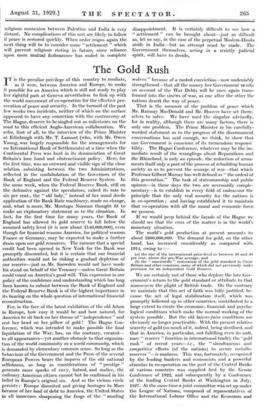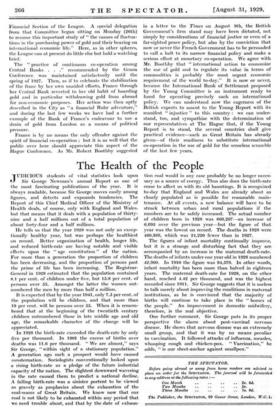The Gold Rush
IT is the peculiar privilege of this country to mediate, as it were, between America and Europe, to make it possible for an America which is still not ready to play her rightful part at Geneva nevertheless to link up with the world movement of co-operation for the effective pro- secution of peace and security. In the turmoil of the past few weeks two incidents, neither of which on the surface appeared to have any connexion with the controversy at The Hague, deserve to be singled out as milestones on the road to this efficient Anglo-American collaboration. We refer, first of all, to the interview of the Prime Minister at Edinburgh with Mr. T. Lamont (who, with Mr. Owen Young, was largely responsible for the arrangements for an International Bank of Settlements) at a time when the Continental Press was loud in its denunciation of Great Britain's lone hand and obstructionist policy. Here, for the first time, was an outward and visible sign of the close relation subsisting between the two• Administrations, reflected in the confabulation of the Governors of the Bank of England and the Federal Reserve System. In the same week, when the Federal Reserve Bank, still on the defensive against the speculators, raised its rate to six per cent., the "old lady," instead of her usual docile application of the Bank Rate machinery, made no change, and, what is more, Mr. Montagu Norman thought fit to make an explanatory statement as to the situation. In fact, for the first time for many years, the Bank of England has allowed its gold reserve to fall below the assumed safety level (it is now about £140,000,000), even though for financial reasons America, for political reasons France or Germany, may be expected to make a further drain upon our gold resources. The rumour that a special credit had been opened in New York for the Bank was promptly discounted, but it is certain that our financial authorities would not be risking a gradual depletion of our reserve--just as Mr. Snowden would not have made his stand on behalf of the Treasury—unless Great Britain could count on America's good will. This expression in our policy of the confidence and understanding which has long been known to subsist between the Bank of England and the Federal Reserve Bank is of the highest importance in its bearing on the whole question of international financial reconstruction.
For, in the face of the latest exhibition of the old Adam in Europe, how easy it would be and how natural, for America to sit back on her throne of " independence " and rest her head on her pillow of gold ! The Hague Con- ference, which was intended to make possible the final liquidation of the War, has, on the contrary, created— to all appearances—yet another obstacle to that organiza- tion of the world community as a world community, which is demanded by elementary common sense. So long as the behaviour of the Government and the Press of the several European Powers bears the impress of the old national selfishness, so long as considerations of " prestige " generate more sparks of envy, hatred, and malice, the ordinary American citizen cannot but be confirmed in his belief in Europe's original sin. And so the vicious circle persists ; Europe disunited and giving hostages to Mars because of her load of debt to America, the United States in all innocence sharpening the fangs of the "snarling wolves " because of a rooted conviction—now undeniably strengthened—that all the money her Government re:nits on account of the War Debts will be once again trans- formed into the sinews of war, as one after the other the nations desert the way of peace.
That is the measure of the problem of peace which Mr. Ramsay MacDonald and Mr. Hoover have set them- selves to solve. We have used the singular advisedly, for in reality, although there are many factors, there is only one problem. The Prime Minister in his carefully- worded statement as to the progress of the disarmament conversations has said enough, we think, to show that our Government is conscious of its tremendous responsi bility. The Hague Conference, whatever may be the im- mediate result of the wranglings about Reparations and the Rhineland, is only an episode, the reduction of arma- ments itself only a part of the process of rebuilding human society so as to prevent the scourge of war—that which Professor Gilbert Murray has well defined as" the ordeal of this generation." The task of statesmanship and public opinion—in these days the two are necessarily comple- mentary—is to establish in every field of endeavour the principle that the only real security for the nations is in co-operation ; and having established it to maintain that co-operation with all the moral and economic force we possess.
If we would peep behind the façade of the Hague we should see that the crux of the matter is in the world's monetary situation.
The world's gold production at present amounts to about £800,000,000. The demand for gold, on the other hand, has increased considerably as compared with 1914, owing to
(a) the rise of the international price-level to between 40 and 50 per cent, above the pre-War average, and (b) the " unscientific " restoration of the gold standard in Great Britain and other countries, many of which did not previously make provision for an independent Gold Reserve.
We are certainly not of those who deplore the late Gov- ernment's return to the gold standard or attribute to that manoeuvre the plight of British trade. On the contrary we maintain that this act of faith was fully justified, be- cause the act of legal stabilization itself, which was promptly followed up in other countries, contributed to a large extent to create the economic, financial, and psycho- logical conditions which make the normal working of the system possible. But the old laissez-faire conditions arc obviously no longer practicable. With the present relative scarcity of gold (so much of it, indeed, being sterilized, and that in America, in particular, not fulfilling even its ordi_ nary" reserve "function in international trade), the "gold rush" of recent years—i.e., the "simultaneous and competitive efforts (of the nations) to secure metallic reserves "—is madness. This was, fortunately, recognized by the leading bankers and economists and a powerful stimulus to co-operation on the part of the Central Banks of various countries was supplied first by the Genoa Conference of 1922, and subsequently by a Conference of the leading Central Banks at Washington in July, 1927. At the same time a joint committee was set up under the League of Nations, composed of representatives of the International Labour Office and the Economic and Financial Section of the League. A special delegation from that Committee began sitting on Monday (26th) to resume this important study of " the causes of fluctua- tions in the purchasing power of gold and their bearing on international economic life." Here, as in other spheres, the League can at present do little else but hold a watching brief.
The "practice of continuous co-operation among Central Banks . . ." recommended by the Genoa Conference was maintained satisfactorily until the spring of 1927. Then, as if to celebrate the stabilization of the franc by her own unaided efforts, France through her Central Bank reverted to her old habit of hoarding gold and in particular withdrawing gold from abroad for non-economic purposes. Her action was then aptly described in the City as "a financial Ruhr adventure," and during the last few weeks we have had a further example of the Bank of France's endeavour to use a drain of gold from London as a means of political pressure.
France is by no means the only offender against the spirit of financial co-operation ; but it is as well that the public over here should appreciate this aspect of the Hague Conference. As Mr. Robert Boothby suggested in a letter to the Times on August 9th, the British Government's firm stand may have been dictated, not simply by considerations of financial justice or even of a far-sighted peace policy, but also by the conviction that now or never the French Government has to be persuaded to call a halt to its narrow financial policy and make a serious effort at monetary co-operation. We agree with Mr. Boothby that "international action to economize the use of gold and to regulate its value in terms of commodities is probably the most urgent economic requirement of the world to-day." It is now or never, because the International Bank of Settlement proposed by the Young Committee is an instrument ready to hand for operating precisely such an international policy. We can understand now the eagerness of the British experts to assent to the Young Report with its manifest " injustice " to this country : we can under- stand, too, and sympathize with the determination of our representatives at The Hague that, if the Young Report is to stand, the several countries shall give practical evidence—such as Great Britain has already given—of their readiness to substitute international co-operation in the use of gold for the senseless scramble of the last few years.

































 Previous page
Previous page